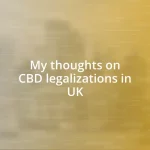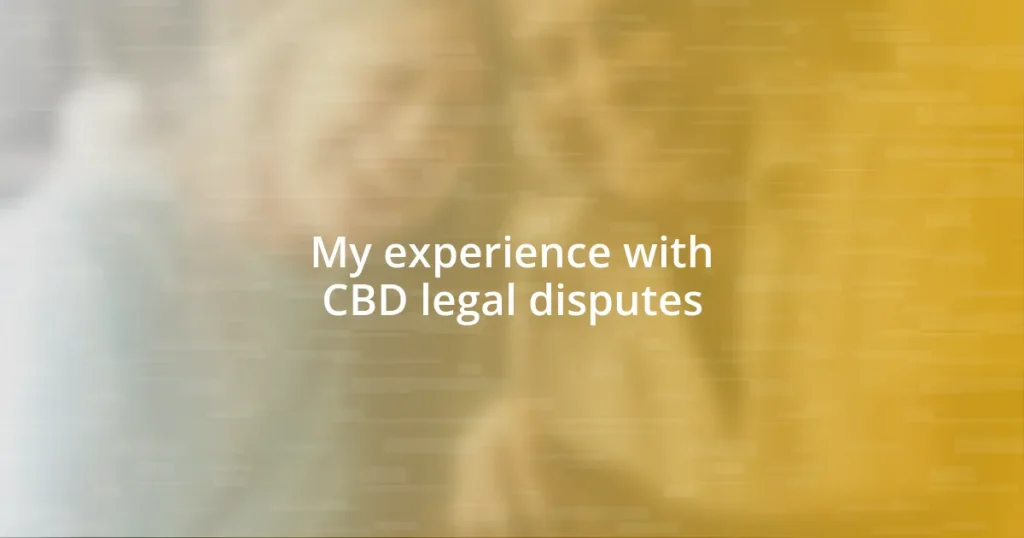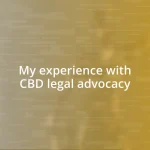Key takeaways:
- CBD laws vary significantly by state, requiring ongoing research and understanding of hemp vs. marijuana-derived products to avoid legal pitfalls.
- Common legal disputes in the CBD industry include product misrepresentation, trademark infringement, and compliance violations, all of which can damage reputations and drain resources.
- Effective dispute resolution strategies include open communication, mediation, and proactive compliance strategies to maintain consumer trust and navigate regulatory changes smoothly.
- Lessons learned emphasize the importance of organization, empathy towards others’ perspectives, and patience in resolving disputes to achieve better outcomes.
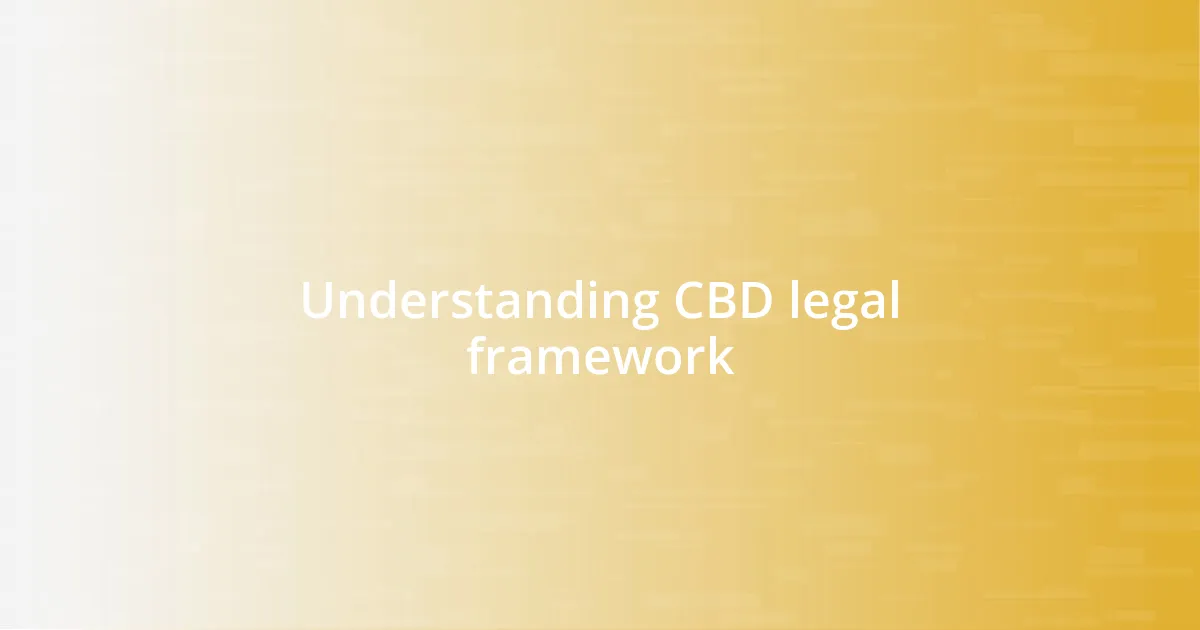
Understanding CBD legal framework
The legal framework surrounding CBD can be quite complex, and I’ll admit, it can feel overwhelming at times. In my own journey, trying to navigate the regulations felt like threading a needle in a haystack; one moment you think you understand the laws, only to find a new guideline or restriction cropping up. Have you ever found yourself researching something with the hope of clarity, only for it to lead to more confusion?
It’s essential to grasp that CBD laws vary widely from state to state. For example, I remember visiting a friend in a different state, and I had to double-check if she could legally buy CBD oil from a local shop. This realization made me appreciate the intricacy of these laws and prompted me to ask—how does one really stay updated on such changing regulations? It’s not just about the legality; it’s about ensuring you’re making informed choices in an ever-evolving landscape.
Moreover, the distinction between hemp-derived CBD and marijuana-derived CBD is crucial, yet many people overlook it. I learned the hard way that many assumptions can lead us astray; I once purchased a product without checking its source, only to find it contained higher THC levels than I expected. This experience reinforced the idea that educating ourselves about these foundational differences can protect both our wallets and our peace of mind. So, when you dive into the world of CBD, remember: knowledge isn’t just power; it’s also your best ally.
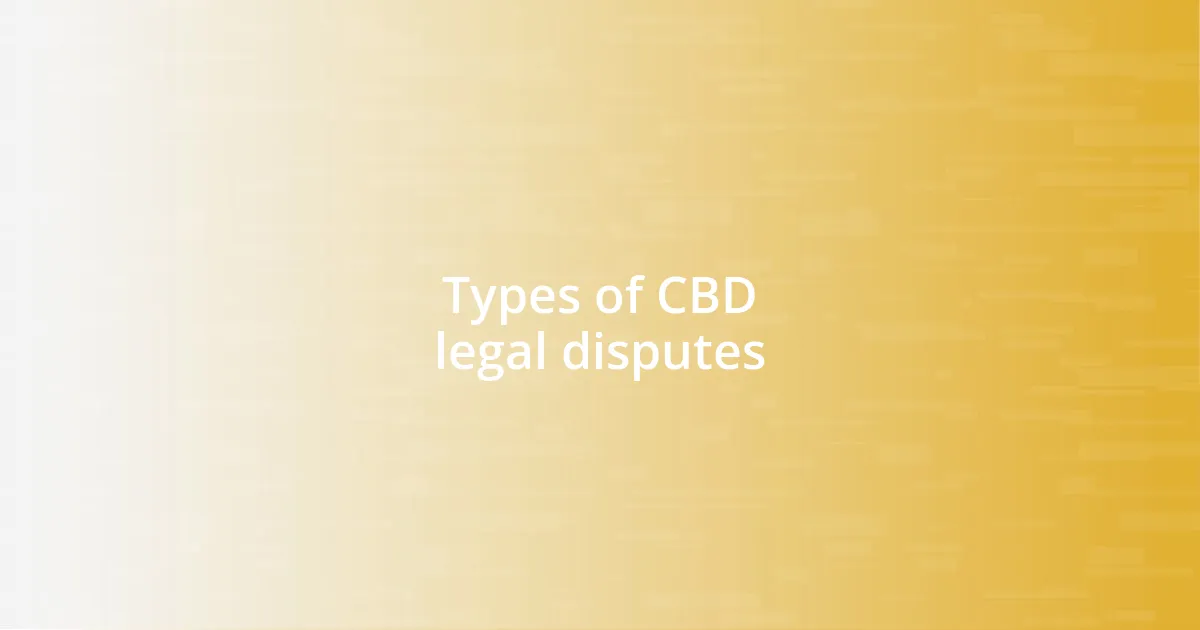
Types of CBD legal disputes
Navigating the world of CBD can lead to various legal disputes, and I’ve encountered a few along my journey. Some common disputes arise over product labeling and marketing claims, where companies may unintentionally mislead consumers. I recall a situation where I purchased a tincture boasting “100% pure CBD,” only to discover later that it contained other substances. This experience highlighted how easily misunderstandings can develop and lead to potential legal issues.
The types of CBD legal disputes can vary significantly. Here are some common categories:
- Product Misrepresentation: Claims about purity or effectiveness that aren’t backed by testing.
- Trademark Infringement: Conflicts over branding, where one company feels another is unfairly using their name or logo.
- Compliance Violations: Issues around not adhering to local or federal regulations governing CBD products.
- Contractual Disputes: Conflicts that arise between suppliers and retailers regarding agreements on product delivery or terms.
- Insurance Claims: Disputes over coverage related to CBD products, especially in the emerging market.
I think it’s crucial for anyone involved in the industry to stay aware of these potential pitfalls. Legal disputes can not only drain resources but also tarnish reputations.
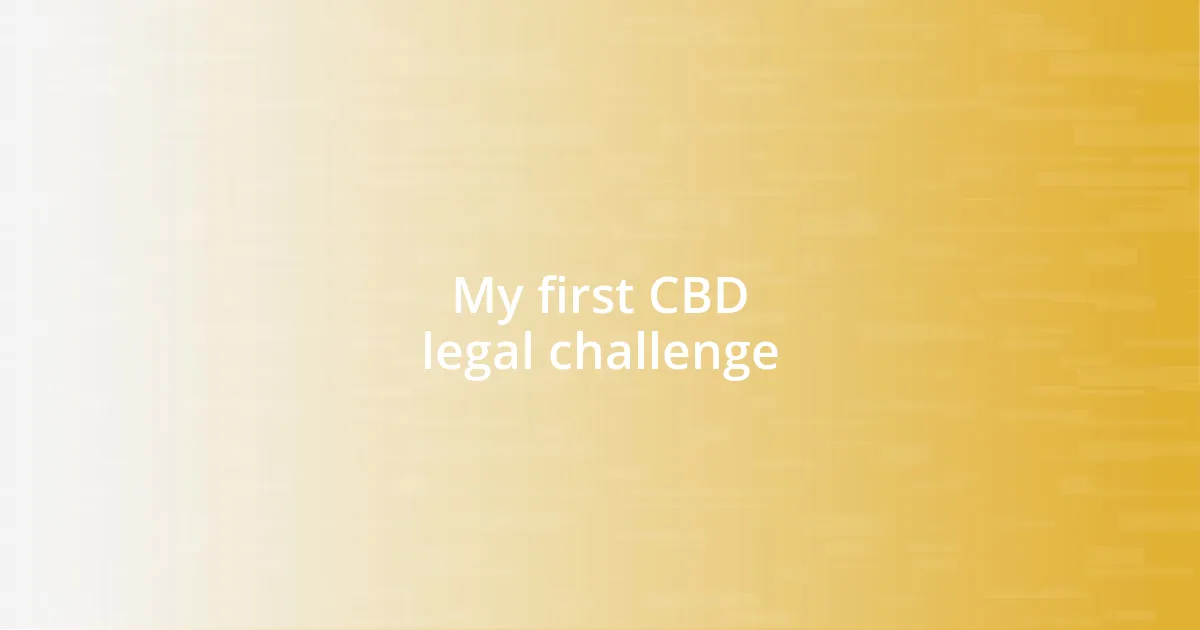
My first CBD legal challenge
When I faced my first CBD legal challenge, I never anticipated how quickly the situation would escalate. I was partnering with a small batch manufacturer, excited about a new line of products we had developed. Just when things were rolling, we received a cease-and-desist letter regarding the labeling claims. I remember the knot in my stomach as I read those official-sounding words—it felt like a punch to the gut. You might wonder, how could something so thrilling turn so daunting so fast?
The reality of legal challenges in the CBD space hit hard; it wasn’t just about brand reputation—it felt personal. I was invested in our product and its potential impact on people’s lives. They say that you don’t truly appreciate something until you face adversity, and that was absolutely true for me. I spent sleepless nights buried in research, retracing our claims, pouring over regulatory documents. I think what really struck me was the sheer unpredictability of the legal landscape; one day, we were riding high, and the next, I was questioning everything we built.
Despite the stress, this experience swiftly became a learning opportunity. It forced me to deepen my understanding of regulatory compliance and the importance of clear, honest labeling. Engaging in conversations with legal experts allowed me to see the bigger picture of how critical it is to put consumer trust first in this industry. In the end, resolving that challenge not only strengthened my resolve but also fortified my commitment to transparency.
| Challenge Faced | Emotional Impact |
|---|---|
| Cease-and-desist letter | Panic and stress |
| Uncertainty about brand | Doubt and reflection |
| Researching regulations | Empowerment through knowledge |
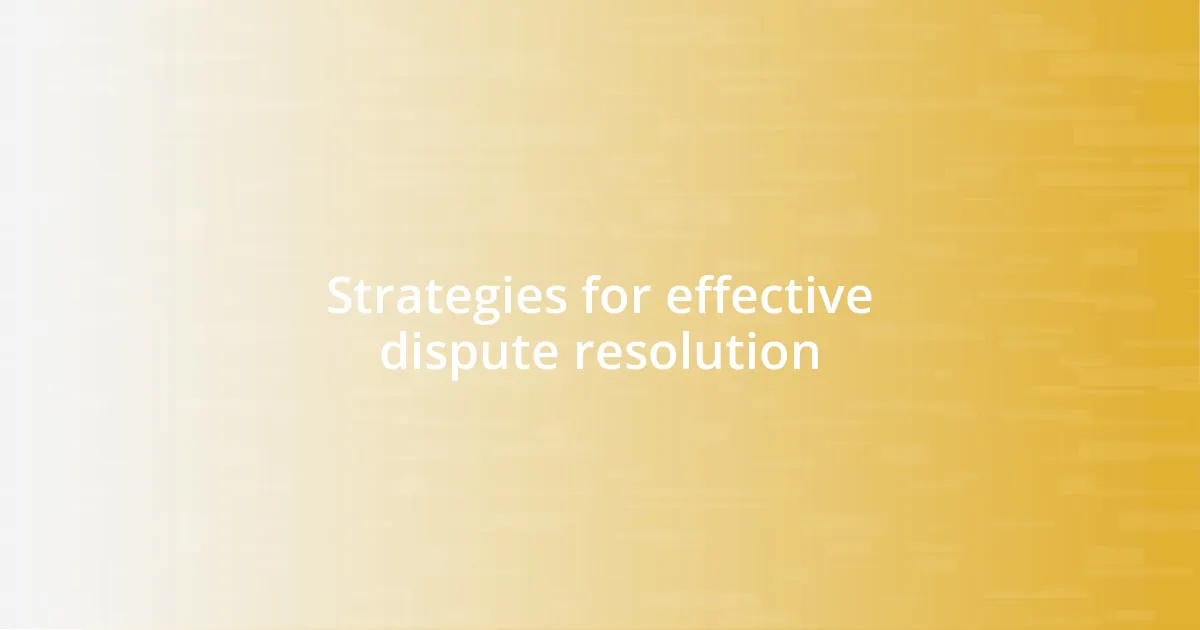
Strategies for effective dispute resolution
One effective strategy I’ve found is to remain open and communicative during disputes. Early in my experience, I encountered a situation where miscommunications led to a misunderstanding with a supplier about product specifications. Instead of letting frustration take over, I initiated a candid discussion, which quickly cleared up the confusion. Have you ever noticed how just a straightforward conversation can dissolve tension? It’s amazing what can happen when you prioritize dialogue over defensiveness.
Mediation has also proven invaluable in resolving conflicts intelligently. I once participated in a mediation session when trademark issues arose with a competitor. The neutral mediator guided both parties through the discussion, helping us see each other’s perspectives. This collaborative approach not only salvaged the relationship but also fostered a greater understanding of my own branding strategy in the long run. I believe that finding common ground is essential; after all, the CBD industry thrives on community and connection.
Lastly, having a proactive compliance strategy in place can be a game changer. I learned this the hard way when I was scrambling to comply with new regulations after a sudden change in local laws. By establishing a routine check for regulatory updates and involving legal counsel early on, I felt more secure and prepared. I sometimes wonder how many disputes could have been avoided if everyone adopted a similar strategy. Embracing this caution not only protects your business but also maintains consumer trust—a vital asset in the CBD space.
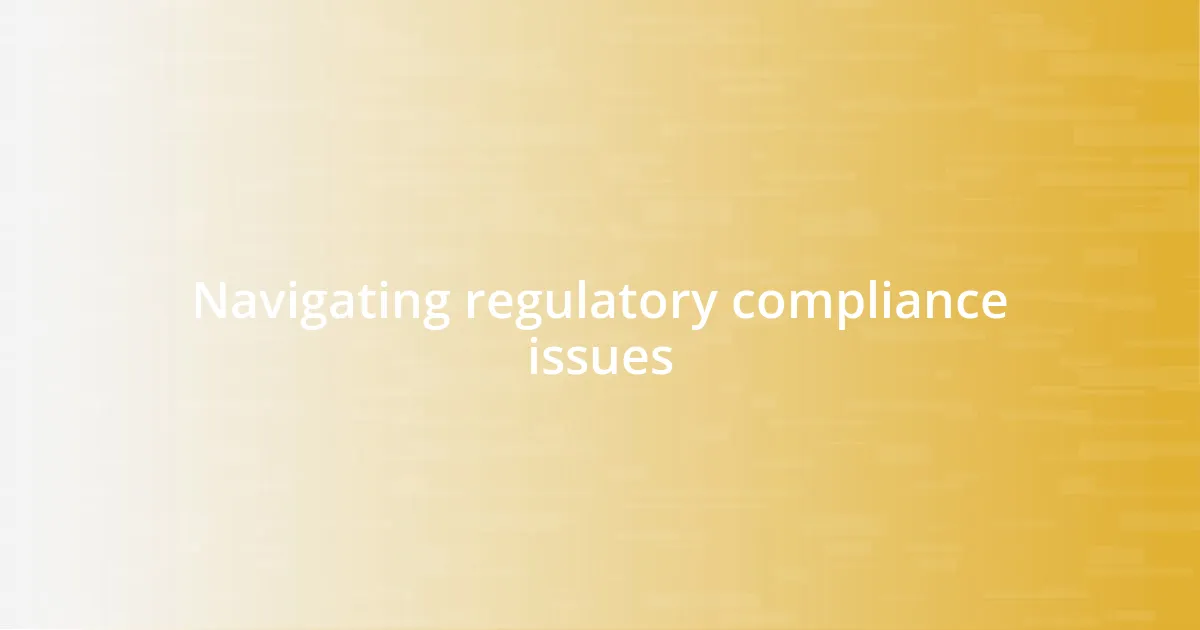
Navigating regulatory compliance issues
Navigating regulatory compliance issues can feel like wandering through a dense fog—one misstep could lead to significant setbacks. I vividly recall an incident where I overlooked essential labeling requirements for our product. That oversight was not just a small detail; it resulted in hefty fines that stung both financially and emotionally. Have you ever experienced that sinking feeling when you realize you could have avoided a mess with a bit more diligence?
In my journey, I discovered that building a solid compliance framework is crucial. After facing my own compliance hiccup, I made it a point to strategize and establish clear guidelines. It was like laying down a safety net; I felt more secure in my decisions. In fact, I began to host regular team meetings focused solely on compliance updates. The collective knowledge shared during those sessions often sparked engaging conversations. When one of my team members brought in a recent case study, we all shared insights that ultimately refined our approach.
I’ve learned that proactive communication with regulatory bodies can also ease the compliance journey. I once reached out directly to local regulatory officials for clarification on emerging regulations, and what a difference that made! The support I received during that conversation was unexpected and immensely reassuring. Have you ever considered how approachable regulators can be when we seek clarification rather than assume? By fostering that relationship, I could address potential issues before they escalated, turning a potentially overwhelming task into a more manageable endeavor.

Lessons learned from my experience
Reflecting on my experiences, I learned that staying organized can truly save you from headaches down the line. There was a time I faced a flurry of paperwork during a dispute over product quality claims. It was overwhelming, to say the least. I vowed never to be caught off guard again, and now I maintain a meticulous filing system for all documentation. When I look back, I can’t help but ask myself—how much smoother would that experience have been if I’d had my ducks in a row from the start?
Another lesson that stands out is the importance of understanding the perspectives of others involved in a dispute. During a disagreement with a distributor, I initially focused too heavily on my own viewpoint. It wasn’t until I took a step back, put myself in their shoes, and acknowledged their concerns that the conversation shifted. That moment not only helped resolve our issue but also reinforced a crucial principle: empathy can turn a contentious situation into a collaborative effort. Have you ever realized that connecting on a human level can open doors you didn’t know were there?
Lastly, I’ve come to appreciate the role of patience in navigating legal disputes. Early on, I was eager to push through resolutions, believing speed equated to efficiency. However, I learned the hard way that rushing often leads to mistakes. In one particular case, taking a breath and allowing time for reflection ultimately led to a much more favorable outcome. It’s like waiting for a pot of water to boil; hurrying only prolongs the process. Don’t you think a little patience can unlock clarity and better decisions in the heat of conflict?







